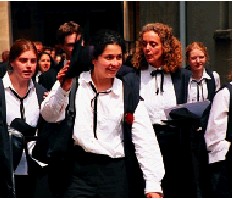| Vol. 12. No. 3 |
Winter 2002 |


THE ROAD TO RHODES
|
Rhodes Scholars are identified by their home state, the Oxford
college they attended, and the year they became a scholar—e.g.,
|
Rhodes Scholars are identified by their home state, the Oxford college they attended, and the year they became a scholar — e.g., California & Jesus, 1975. Former U.S. President Bill Clinton (Arkansas & University College, 1968) was one. So was former Harvard president Neil L. Rudenstine (Connecticut & New College, 1956), singer/songwriter Kris Kristofferson (California & Merton, 1958), and 1996 Olympic gold medallist Annette Salmeen (California & St John's, 1977).
All were Rhodents — that is, recipients of the Rhodes Scholarship to England's Oxford University for international graduate study. Though the Fulbright, the Marshall, the Mitchell, the Gates Cambridge Scholarship, and the Carnegie International Endowment for International Peace Junior Fellows program also offer recipients the chance to study abroad, Rhodes Scholarships are still the most widely known, if not the most coveted.
And the oldest. Rhodes Scholarships were first given to scholars-elect in 1903, after the death and in memory of Cecil Rhodes, the British imperialist and business magnate. Rhodes hoped that bright, multidimensional graduate students from what was then the British empire, Germany, and the United States would converge in Oxford and that their time together would promote international understanding and peace. Indeed, each year 95 full-time Rhodes Scholars from around the world, mostly pursuing master's or doctoral degrees, continue to meet at Oxford. Thirty-two of them are American citizens.
Over the years, Utah has contributed 52 of the 2,950 American Rhodes Scholar Oxonians. Local Rhodes Scholars include Scott M. Matheson Jr. (Utah & Magdalen, 1975), dean and law professor at the U of U College of Law, and Patrick Shea (Utah & New College, 1970), former director of the Bureau of Land Management in the Clinton administration.
According to Elliot Gerson (Connecticut & Magdalen, 1974), the American secretary of the Rhodes Trust and an attorney and businessman, Rhodes Scholars come from all disciplines and typically go on to become leaders in every sector. Gale Dick (Oregon & Wadham, 1950), retired U physics professor and a Rhodes Scholar from Reed College, recently attended a 50th reunion of his Oxford classmates and confirms this. "Nobody had a boring career," he reports. "And most of them have, post retirement, moved onto a second career of some sort or another."
 |
 |
 |
Competition for the generous and often-romanticized Rhodes is very stiff, as the two-year award covers all educational costs, travel expenses to and from Oxford, and a living and vacation travel stipend of about $16,000 per year. Recipients may renew scholarships for a third year and receive additional grants for research purposes or study-related travel.
The Rhodes application process is arduous, requiring applicants to summarize themselves, their academic goals, and their personal aspirations in a 1,000-words-or-less personal statement. Criteria upon which applicants are chosen are stringent — only serious academicians need apply.
Rhodes hopefuls must be U.S. citizens between the ages of 18 and 23 when they apply, and must apply either from a state in which they reside or from a state in which they received two years of college training and a bachelor's degree. After the required institutional endorsement from their university is obtained, aspirants must submit the following: the completed application, a photo, a college transcript, a minimum of five, but not more than eight, letters of recommendation, proof of age and citizenship, a list of principal college activities and honors, and the personal statement.
|
|
David Harding '02 was a Rhodes Scholar state finalist who moved on to the district level last year and has applied for the Rhodes again this year. The metallurgical engineering student, who received eight scholarships prior to and during his undergraduate work, estimates that the first time around he spent 150 hours writing and revising his personal statement and another 50 hours readying the rest of the application materials.
While demonstrated intellectual and academic excellence is a requirement for potential Rhodents, Cecil Rhodes didn't want only gentry or brainy bookworms as scholars. As set forth in his will, applicants are judged by four standards: literary and scholastic achievements; energy to use one's talents to the full, as exemplified by fondness for and success in sports; truth, courage, devotion to duty, sympathy for and protection of the weak; kindliness, unselfishness, and fellowship.
"It's fair to say that academic excellence is the fundamental criterion but it's not sufficient alone," says Gerson. "It's the other factors of character, leadership, service, ambition, and energy that tip the balance."
Former Rhodes Scholar Janice Ugaki BS'92 BA'92, originally from Blackfoot, Idaho, gives this advice to prospective Rhodes applicants: "You should know yourself and what you feel passionate about in life. But more important, you need to be able to express who you are, what you believe, and what your passion is in the interviews and at the reception."
Because of the intensive application process and the requirement to have a bachelor's degree before commencing classes at Oxford, preparation to apply for the Rhodes should begin by the spring of the junior year.
This is the fifth year Maureen O'Hara Ure BA'70 MFA'79, assistant professor/lecturer in the U's Department of Art and Art History, has been a member of the U's Institutional Endorsement Committee. O'Hara Ure reports that students are mentored through the application process, with the committee conducting mock interviews and providing feedback. "We demystify the rigorous Rhodes application process for U of U applicants," explains O'Hara Ure, mother of Rhodes Scholar Heather Ure Dunagan (Utah & Jesus, 1995).
"Many of the committee members remember the first time someone — a teacher or other authority we respected — suggested we had the potential to excel in a field and that we risk trying for an opportunity for which we might not have imagined we were qualified," says O'Hara Ure. "Having faculty encouraging a student to apply for the Rhodes or other opportunities sometimes is the boost that strong students — our potential applicants who meet the Rhodes criteria — need in order to consider embarking on this rigorous process."
Typically, five University students are given institutional endorsement. These students are then invited to a reception and separate interview with the State Committee of Selection. Those chosen as state finalists are invited to interview with the District Committee of Selection. (The 50 states are grouped into eight districts.) Four finalists from each district are chosen as Rhodes Scholars immediately following the interviews.
Jennifer Mabey, academic coordinator in the U's Office of Undergraduate Studies, says, "Of course students are disappointed when they aren't chosen. But they also realize that even being a Rhodes district finalist is an honor because the other applicants are all outstanding. Additionally, the whole experience of applying and interviewing for the scholarship is great preparation for graduate school."
Such was the case for Jared Anderson BA'02, a U honors student who applied for the Rhodes. "Though I didn't get past the first step in applying for the Rhodes, the process focused my goals and taught me how to prepare strong applications," he explains. "But what it meant was I also had a year to prepare for the Marshall Scholarship."
In the ensuing 12 months, Anderson became "proactive and focused" — corresponding with professors at universities around the world, receiving additional awards, boning up on current events by reading The New York Times daily, and charting out the next 10 years of his life. (He hopes to teach courses on the transmission and translation of the Bible).
By the time he applied for the Marshall Scholarship, Anderson was much better prepared. In the fall of 2001, he was selected as a national finalist for the two-year, full-ride, all-expenses-paid fellow-ship to study in the U.K., and ultimately was chosen to be one of four reserve candidates.
|
Janice Ugaki, who calls her Rhodes experience "spectacular,” graduated summa cum laude from the University of Utah in 1992 with Honors degrees in political science and finance and a minor in Japanese. |
"In hindsight, things have worked out for the best. If I had gone to Oxford or another British university I would have spent the first few years just learning languages," explains Anderson, who was accepted into a graduate program in religious studies at the University of North Carolina at Chapel Hill. "Instead, I will go to England during my dissertation research or after my Ph.D. By the time I get there I will know the languages and have the skills I need to take advantage of Oxford's great resources."
Ugaki, who calls her Rhodes experience"spectacular," graduated summa cum laude from the University of Utah in 1992 with Honors degrees in political science and finance and a minor in Japanese. Although she applied for the Rhodes as a U student, it wasn't until she applied again in the fall of 1992, during her first year of Harvard Law School, that she was chosen as a Rhodes Scholar.
"The second time around I knew who I was and I could convey this in my interview much more clearly," says Ugaki, co-founder and chief operating officer of Firmseek, Inc., a technology and marketing firm, based in Washington, D.C.
Shea, currently a natural resource and first-amendment rights attorney in Salt Lake City, says of his Rhodes experience: "The luxury of unfettered and reflective time was of great value. The network I established was incredible. I use it two to three times a week. I have former roommates in Beijing, Washington, and South Africa. In a lot of ways being a Rhodes Scholar is like having a world visa. You can go anywhere and know someone."
The Rhodents and non-Rhodents interviewed agree that applying for the scholarship was well worth the effort. "Being a Rhodes Scholar was an opportunity of a lifetime," says Matheson, former U.S. Attorney for the District of Utah. "I feel extremely fortunate to have been able to do it.
The exposure to outstanding thinkers and scholars at Oxford is one of the great experiences of being there."
Dick, who had a special personal Oxford tutor, concurs. "Besides," he says, "in spite of a dreary climate, Oxford was a very beautiful place to live."
—Ann Jardine Bardsley BA'84 is a writer in the U's public relations office.

